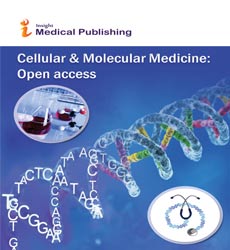Abstract
ÃÆà ½Ãâñ Globin Hemoglobinopathy as A Case Study: Mutants and Prototype Mutants: Are They Absent ÃÆà ½Ãâñ0, Reduced ÃÆà ½Ãâñ+ or Recombinant?
Recently the existence of prototype mutants in β globin genes was proved. In this study a further and similar investigation was performed. The investigation concerns the Homo sapiens α globin. The prototype mutants were screened in the α globin DNA sequences. The results proved their existence. A selected α globin fragment contains the prototype mutant was used for searching both of the nucleotide and protein databases. The used fragment consists of nine nucleotides GGC AAG GTT and contain two silent mutants with the following amino acids sequences GKV. Searching the Blast protein database for the existence of correct mutants using the V00493.7 Homo sapiens 27 amino acids fragment was led to find 50 different sequences. Interestingly the protein sequences show similarity with marsupials, even-toed ungulates, odd-toad ungulates, placental, bats, rodents, carnivores, whales and dolphins; primates, insectivores, rabbits and hares. Species responsible for human bit or blood transfer are located and suggest gene recombination between different species occure through blood transfer. The restriction map for the 81 nucleotides for four nucleotide sequences (one prototype mutant, two correct mutants, and one normal) proved change in the restriction enzymes profile of the α globin sequences. That might be a proof for the existence of reduced α+ globin (also in case of β+ globin) macromolecules. The protein modelling in the selected different fragments show differences in the 3D structure and in their hydrophobicity. The unexpected exo-sources for the α globin put another load on the possibility of the haemoglobin illness solving. However, avoiding marriage from relatives, and from the same ethnic groups might be the best choice. Additionally avoiding blood contact with animals have compatible mutants is recommended. Further investigations are in need to prove/disprove the role of the gene recombination between species through blood in the transfer of the α globin mutants or even other ones.
Author(s):
Al-Fattah Amara AA
Abstract | Full-Text | PDF
Share this

Google scholar citation report
Citations : 187
Cellular & Molecular Medicine: Open access received 187 citations as per google scholar report
Abstracted/Indexed in
- Google Scholar
- China National Knowledge Infrastructure (CNKI)
- Cosmos IF
- Geneva Foundation for Medical Education and Research
- Secret Search Engine Labs
Open Access Journals
- Aquaculture & Veterinary Science
- Chemistry & Chemical Sciences
- Clinical Sciences
- Engineering
- General Science
- Genetics & Molecular Biology
- Health Care & Nursing
- Immunology & Microbiology
- Materials Science
- Mathematics & Physics
- Medical Sciences
- Neurology & Psychiatry
- Oncology & Cancer Science
- Pharmaceutical Sciences

